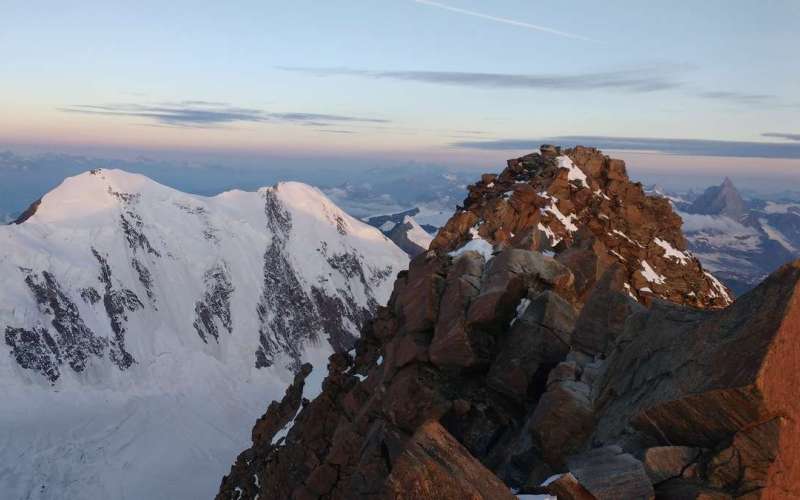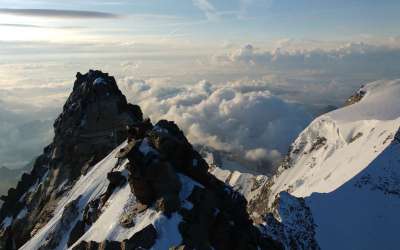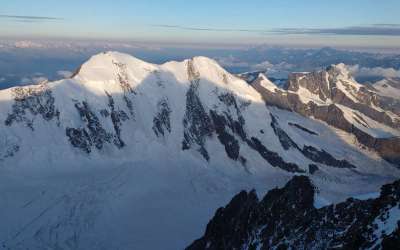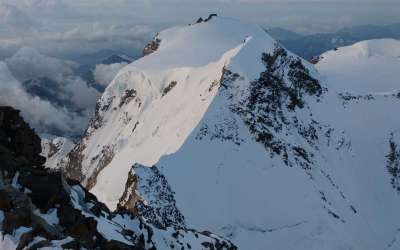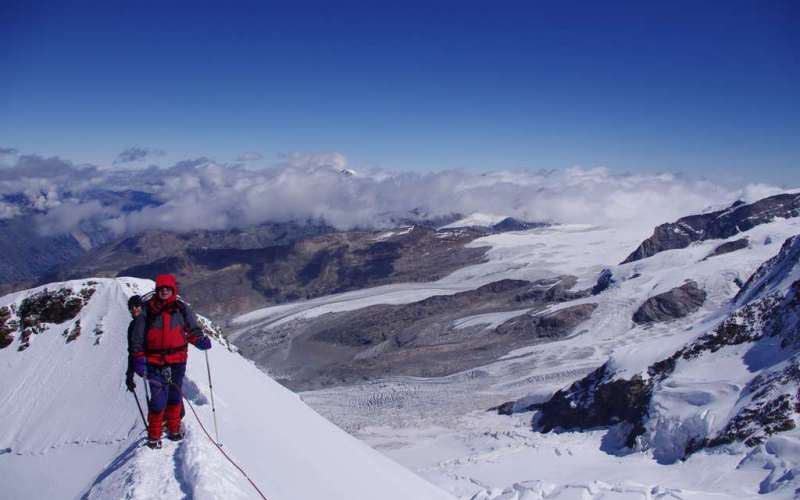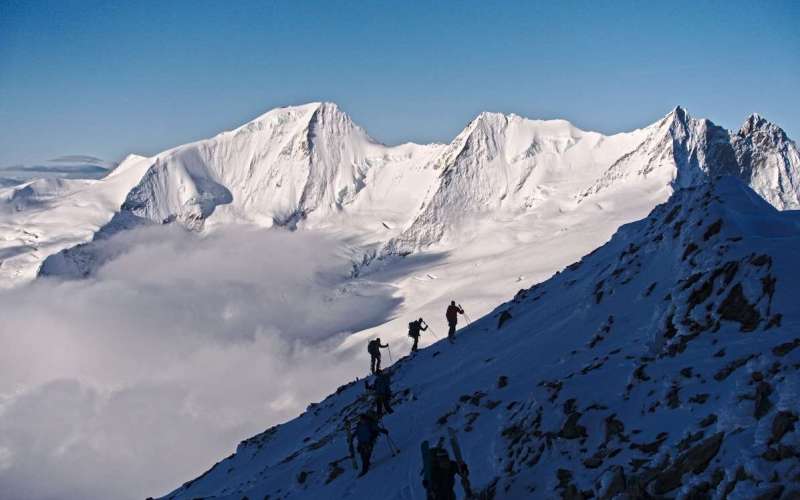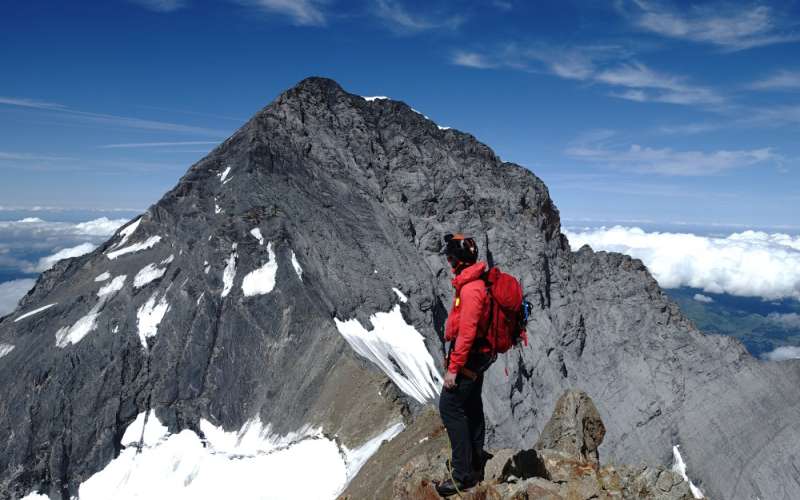Liskamm - Dufourspitze Traverse
The Monte Rosa Peaks Traverse is justly on every peak beggar's bucket list. But when you strip the Spaghetti Tour down to the essentials, you will be left with three major peaks: Castor, Liskamm and Dufourspitze.
And since simple and straightforward design tends to have a universal appeal to us, we've transferred the idea to mountaineering. The speed version of the classic Monte Rosa Peaks Traverse keeps you climbing on the ridgeline of the Monte Rosa Massif for three consecutive days! From the second day on you will permanently climb and even sleep above 4200 m. The only "side trip" will lead to the Quintino Sella hut to spend the night after the first day.
In sum, it's probably the best possible way to combine 4 high and major 4000 meter peaks in the shortest time possible: Castor (4221 m), Liskamm (4527 m), Dufourspitze (4634 m) and Nordend (4608 m). Not to mention Signalkuppe and Zumsteinspitze, which literally lie en route.
What sounds extreme is in fact in reach for capable and fit alpinists. Given a thorough acclimatization which is crucial, the Monte Rosa Short Traverse is peak wise one of most effective and rewarding 3 days you can spend in the mountains around Zermatt.
Itinerary
Day 1: Meet your guide in Hotel Bergfreund in Herbriggen at 6 p.m. Kit check and safety Routines rehearsal. If you are already staying in Zermatt the meeting point can be arranged at your Hotel.
Day 2: Cablecar ride to Klein Matterhorn (3800 m). We'll traverse below Breithorn and Pollux and head towards Castor. Descent down to Quintino Sella Hut (3585 m) where we'll spend the night.
Depending on conditions and fitness we can collect further summits en route. Vertical ↑ 800 ↓ 1000 m
Day 3: Today we'll tackle the first Monte Rosa Traverse highlight and one of the classic ridgelines in the Alps: Liskamm West- to East Summit. For more than 2 kilometers we'll walk on a knife-edged ridge line with head spinning views into the huge Liskamm eastface. The night is spent on the Magherita Hut(4554 m), the highest building in Europe. Vertical ↑ 1000 ↓ 900 m
Day 4: We'll climb the third highest point of the Alps, the Dufourspitze, via interesting mid grade mixed terrain. Zumsteinspitze is literally on the approach — peak bagging made easy! From the Silbersattel, the Nordend is also only a stone throw away and could be our third summit for today. An exciting alternative is the Cresta Rey which leads directly to the highest point and will be worth the money for those familiar with mixed terrain and UIAA Grade III Rock. Long descent to the Monte Rosa Hut where we stop for lunch and then continue the long way to Zermatt.Vertical ↑ 800 ↓ 2300 m
Prerequisites
- Excellent physical fitness: stamina for 5 hours of ascent (up to 1400 meters vertical), overall time of exercise 8-10 hours;
- Good technical skills: very good crampon technique; confidence in frontpointing; climbing skills up to the French grade 3a with crampons.
- Good pre-acclimatisation required. We recommend staying on a hut above 3000 m at least one night or hike a couple of 3000 meter peaks around Zermatt prior to the trip.
Getting There
The nearest Airports are Geneva, Bern and Zürich. We will try to pick you up at a convenient meting point depending on where you are travelling from.
Accommodation & Food
You will stay on typical alpine mountain huts. They have a big dining room and dormitories with usually 4 – 12 bunks. Sometimes the dormitories have up to 20 bunks. The sanitary conditions are basic with common toilets, washing rooms and only rare showers. On very high huts there is sometimes not even running water.
We typically have half board on the hut. A lean breakfast with bread, jam, butter and, depending on the region, cereals are served along with coffee or tea. Dinner consists of 3 to 4 courses: starter (soup, pasta in Italy), sometimes salad, main course with some meat, desert. Vegetarian or other dietary requirements are accounted for.
You can order non-alcoholic drinks, beer and wine. Likewise, snacks and lunch can be purchased. On the higher huts there is no potable water and you will have to buy bottled water.
Please don't hesitate to contact us in case of questions.
Gear
Full glacier travel kit.
Included
- Organization and guiding by a IFMGA licensed Mountain Guide
- Rental gear
- All guide's expenses
Excluded
- 2 x Nights / Half board on mountain huts approx. 65 €/Night (alpine club members)
- Cablecar about 120 €
- Lunch and drinks on the huts. (lunch for take away can be ordered the day before)
- personal insurance covering mountain rescue
Specials
for this trip
Flexibility: joint risk of bad (weather) conditions.
Flexibility is our working method - not a slick marketing slogan. We budget 1-2 extra days in the planning of many of our trips to factor in adverse weather conditions. The days can for example be used to move the trip a day or two as to use the best weather window for the summit bid.
Of course you only pay the actual guiding days. We'd rather achieve your goal than insist on doing a poor alternative.
Alternate dates: if it doesn't work out first try.
Ambitious alpine goals require the right conditions and this might not be the case on your first try. We understand that you don't want to hire a guide for not climbing your cherished dream route. On our individually arranged trips we discuss and agree on how to deal with this situation prior to the trip.
Understandably we cannot cancel all our trips in the high season. But we will come up with a fair deal for both sides: a prefixed alternate date, a voucher for the next attempt, an adapted rate for smaller and less committing objectives, or the option to cut off some days.
Fairness first.
The job of mountain guides is demanding and highly responsible. Clearly, this work has to be appropriately remunerated. Yet we are climbers, not tough business men. That's why our emphasis is on dealing fairly with our clients.
We block dates for your trip. Sometimes the arranged climb still doesn't work out. We then appreciate your understanding that we cannot bear the cancellation risk alone. On the other hand we do understand that you don't want to pay the summit rate of a prestigious goal for an alternative destination. With open communication and consideration for each other's situation, we will find a good solution. The summit rate only applies if the conditions are right and we make a summit bid.
Climate protection: less babble.
Environmental protection must not be misused for mere image cultivation. Businesses who earn their money with air travel should not pat themselves on the back because they use recycled paper and green electricity. This is not credible. We clearly acknowledge the undeniable environmental damage our activities cause, and we try to at least partly offset them by the following actions, without too many words:
We encourage you to travel by train. If possible we give you a lift from the train station. We help to reduce your luggage by providing you all the technical gear required for your trip. Given a sufficient number of participants, we cover up to 50% of your train ticket.
We compensate our own as well as the CO2 emissions of our clients travelling by car without any additional cost in a transparent and comprehensive way. Of course, you are also invited to contribute. Get in touch if there are any questions!
Additional Info
and links
Group size:
We are guiding the Liskamm Traverse at a 1:1 guide:client ratio, since the seriousness of the climb is highly condition dependent. And those can often not be predicted long in advance. Instead of skipping the highlight of the trip we'd rather provide the best prerequisites to summit. For strong climbers and given good snow conditions, it is nevertheless possible to do the trip with two clients. Please get in touch to discuss options.







